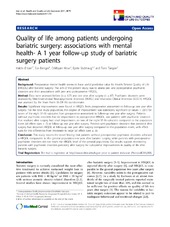| dc.contributor.author | Lier, Haldis Økland | en_US |
| dc.contributor.author | Biringer, Eva | en_US |
| dc.contributor.author | Hove, Oddbjørn | en_US |
| dc.contributor.author | Stubhaug, Bjarte | en_US |
| dc.contributor.author | Tangen, Tone | en_US |
| dc.date.accessioned | 2012-01-23T10:46:11Z | |
| dc.date.available | 2012-01-23T10:46:11Z | |
| dc.date.issued | 2011-09-26 | eng |
| dc.Published | Health and Quality of Life Outcomes 9:79 | en |
| dc.identifier.issn | 1477-7525 | |
| dc.identifier.uri | https://hdl.handle.net/1956/5492 | |
| dc.description.abstract | Background: Preoperative mental health seems to have useful predictive value for Health Related Quality of Life (HRQOL) after bariatric surgery. The aim of the present study was to assess pre- and postoperative psychiatric disorders and their associations with pre- and postoperative HRQOL. Method: Data were assessed before (n = 127) and one year after surgery (n = 87). Psychiatric disorders were assessed by Mini International Neuropsychiatric Interview (M.I.N.I.) and Structured Clinical Interview (SCID-II). HRQOL was assessed by the Short Form 36 (SF-36) questionnaire. Results: Significant improvements were found in HRQOL from preoperative assessment to follow-up one year after surgery. For the total study population, the degree of improvement was statistically significant (p values < .001) for seven of the eight SF-36 subscales from preoperative assessment to follow-up one year after surgery. Patients without psychiatric disorders had no impairments in postoperative HRQOL, and patients with psychiatric disorders that resolved after surgery had small impairments on two of the eight SF-36 subscales compared to the population norm (all effect sizes < .5) at follow-up one year after surgery. Patients with psychiatric disorders that persisted after surgery had impaired HRQOL at follow-up one year after surgery compared to the population norm, with effect sizes for the differences from moderate to large (all effect sizes ≥ .6). Conclusion: This study reports the novel finding that patients without postoperative psychiatric disorders achieved a HRQOL comparable to the general population one year after bariatric surgery; while patients with postoperative psychiatric disorders did not reach the HRQOL level of the general population. Our results support monitoring patients with psychiatric disorders persisting after surgery for suboptimal improvements in quality of life after bariatric surgery. | en_US |
| dc.language.iso | eng | eng |
| dc.publisher | BioMed Central | eng |
| dc.relation.ispartof | <a href="http://hdl.handle.net/1956/5763" target="blank">Psychiatric disorders, quality of life and effect of preoperative counselling in patients who undergo bariatric surgery</a> | eng |
| dc.rights | Attribution CC BY | eng |
| dc.rights.uri | http://creativecommons.org/licenses/by/2.0/ | eng |
| dc.title | Quality of life among patients undergoing bariatric surgery: associations with mental health- A 1 year follow-up study of bariatric surgery patients | en_US |
| dc.type | Peer reviewed | |
| dc.type | Journal article | |
| dc.description.version | publishedVersion | en_US |
| dc.rights.holder | Copyright 2011 Lier et al; licensee BioMed Central Ltd. | |
| dc.identifier.doi | https://doi.org/10.1186/1477-7525-9-79 | |
| dc.identifier.cristin | 863379 | |
| dc.subject.nsi | VDP::Medical disciplines: 700::Clinical medical disciplines: 750::General surgery: 780 | eng |
| dc.subject.nsi | VDP::Medical disciplines: 700::Health sciences: 800 | eng |

